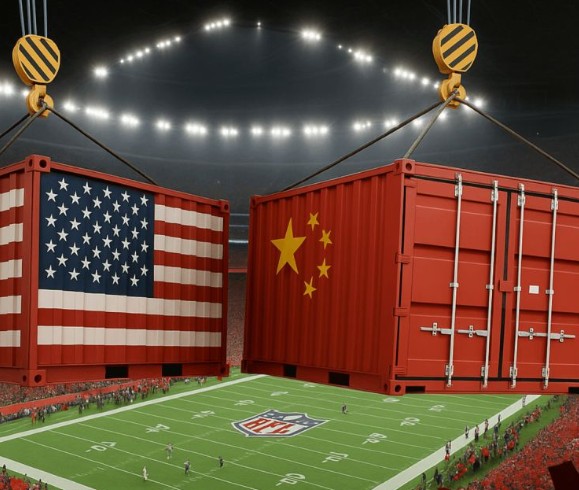The NFL is often seen as a fortress of American culture unshaken by global politics, insulated from international economics. But in today’s interconnected world, even the gridiron isn’t immune to the tremors of trade wars. Tariffs, once thought to be the concern of economists and diplomats, are now quietly influencing everything from the price of a fan’s jersey to the league’s international expansion strategy. Let’s break down the multifaceted impact.
The Jersey Dilemma: Fans Paying the Price
NFL jerseys are more than just fan gear they’re cultural symbols, collectibles, and billion-dollar business assets. But recent tariff hikes have turned this merchandising empire into a battleground.
Global Manufacturing Meets American Policy
Most NFL jerseys are manufactured in countries like Bangladesh, China, Pakistan, India, and Vietnam. These nations have been hit with steep reciprocal tariffs by the U.S. government ranging from 26% to 46%. For example:
- Bangladesh: 37% tariff
- China: 34%
- Pakistan: 29%
- India: 26%
- Vietnam: 46%
These tariffs are based on what the U.S. claims other countries impose on American goods, with the U.S. retaliating by imposing half that rate.
The Real Cost to Fans
While the manufacturing cost of a $100 jersey is typically around $12–$15, a 40% tariff adds roughly $4–$6 to the import cost. That might seem small, but:
- Retailers often pass these costs to consumers, especially when inflation is already squeezing margins.
- Combined with rising shipping and labor costs, the final price tag can balloon.
- The BBC reported that the price of England’s Euro 2024 shirt rose 18.6% compared to the 2002 World Cup jersey a trend that mirrors NFL pricing.
Counterfeit Culture on the Rise
Faced with rising prices, fans are turning to counterfeit markets. A survey by The Athletic found that 52% of Premier League fans had knowingly purchased fake jerseys. The NFL, with its similarly passionate fan base, is likely experiencing the same shift.
International Games: Tariffs Threaten Global Expansion
The NFL has spent the last two decades expanding its global footprint. From London to Mexico City, and now Dublin, Madrid, Berlin, and São Paulo, the league is chasing international audiences. But tariffs could throw a wrench into this strategy.
The Global Schedule
In 2025 alone, the NFL has seven games scheduled outside the U.S., including first-ever regular-season contests in Dublin, Madrid, and Berlin. These games are vital for:
- Growing the fan base
- Attracting international sponsors
- Selling merchandise abroad
Political Rhetoric and Economic Uncertainty
Former President Trump recently floated the idea of placing a 100% tariff on foreign-produced movies, citing national security concerns. While this was aimed at Hollywood, it raised alarms across the entertainment industry including sports.
- If foreign-produced entertainment is targeted, could NFL games played abroad be next?
- Would tariffs apply to ticket sales, broadcast rights, or merchandise sold at international venues?
- Could this discourage the NFL from scheduling future games overseas?
The White House has since walked back the comments, saying no final decision has been made. But the uncertainty alone could make sponsors and league executives nervous.
Ownership and Sponsorship: The Ford Family Case Study
The Detroit Lions are owned by the Ford family, whose fortunes are tied to the auto industry. With new auto tariffs expected to cost Ford Motor Company billions, the question arises: could this impact the team?
Lions President Speaks Out
Rod Wood, president of the Lions, stated that the team’s operations won’t be affected by Ford’s losses. However, he acknowledged:
- Sponsor Concerns: Many of the team’s partners are tied to the auto industry and are “very concerned” about the tariffs.
- Industry Vulnerability: Even domestic cars rely heavily on imported parts, which are now subject to tariffs.
Broader Implications
While the Lions may be stable, other teams with corporate ownership or sponsorships could face:
- Reduced advertising budgets
- Fewer promotional events
- Hesitation to invest in stadium upgrades or fan experiences
Economic Ripple Effects: The NFL Isn’t an Island
Tariffs don’t just affect direct costs they influence investor confidence, stock markets, and consumer behavior. Following Trump’s tariff announcement, U.S. stocks saw their biggest drop since 2020.
What This Means for the NFL
- Ticket Sales: Economic uncertainty can lead fans to cut back on discretionary spending, including game tickets.
- Fantasy Football & Streaming: Subscriptions to NFL-related services may decline if consumers tighten their wallets.
- Sponsorships: Brands facing financial strain may reduce their NFL marketing budgets.
Let’s zero in on the 2024 to 2025 cost increases for NFL game day experiences, specifically those driven by tariffs. While inflation and stadium upgrades play a role, tariffs on imported goods like aluminum, steel, textiles, and electronics have had a measurable impact on everything from tailgating gear to concessions and ticket prices.
NFL Game Day Cost Increases (2024 → 2025) Attributed to Tariffs
Here’s a breakdown of how much more fans are spending in 2025 compared to 2024, with real-world examples and tariff-related drivers:
| Category | Avg Cost (2024) | Avg Cost (2025) | Increase | Tariff Impact |
| Ticket | $137.00 | $145.00 | +$8.00 | Stadium upgrades using tariffed imports |
| Parking | $31.00 | $35.00 | +$4.00 | Tariffs on imported asphalt, lighting equipment |
| Concessions | $26.00 | $30.00 | +$4.00 | Tariffs on aluminum cans, packaging, food imports |
| Tailgating Gear | $60.00 (group) | $70.00 (group) | +$10.00 | Tariffs on grills, coolers, tents, textiles |
| Total (per fan) | ~$210.00 | ~$255.00 | +$45.00 | ~18–22% increase |
Real-Life Examples from 2025
Levi’s Stadium (49ers)
- 2024: $229.00 for ticket, beer, hot dog, and parking
- 2025: $239.66 up $10.66, driven by higher concession costs and stadium tech upgrades using tariffed electronics
Lincoln Financial Field (Eagles)
- 2024: $219.50
- 2025: $225.01 up $5.51, with beer and soda prices rising due to aluminum and syrup ingredient tariffs
YETI Coolers (Tailgating Gear)
- 2024: $329 for Tundra 65
- 2025: $379 up $50, due to tariffs on Chinese aluminum and plastics used in manufacturing
Weber Grills (Tailgating Gear)
- 2024: $219 for Q1200
- 2025: $249 up $30, linked to tariffs on imported steel and electronic components
Why Tariffs Matter
Tariffs in 2025 have targeted:
- Aluminum & steel: Affecting beer cans, grills, stadium infrastructure
- Textiles & plastics: Driving up costs for tents, chairs, packaging
- Electronics: Raising prices on stadium upgrades and smart ticketing systems
- Food imports: Impacting condiments, spices, and packaging materials
These costs are passed down the chain from vendors to stadiums to fans resulting in a noticeable bump in what it takes to enjoy an NFL Sunday.
Final Thoughts: The NFL’s Global Game Faces a Global Challenge
The NFL may be headquartered in New York and rooted in American tradition, but it’s increasingly a global enterprise. Tariffs once distant concerns are now shaping the league’s economics, strategy, and fan experience.
From the stitching on a jersey to the roar of a crowd in Berlin, the ripple effects of trade policy are being felt across the NFL. Whether the league adapts with resilience or faces setbacks will depend on how it navigates this complex intersection of sports and geopolitics.

